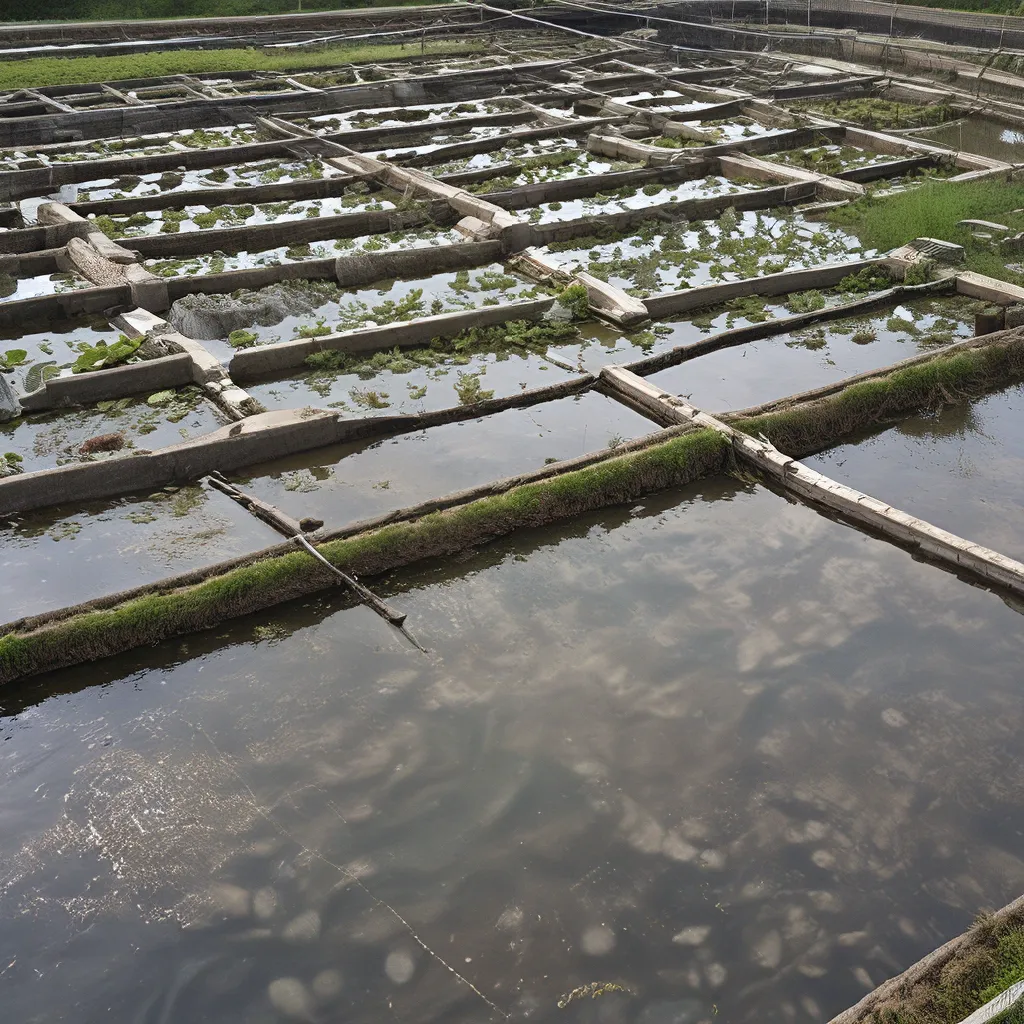
As someone deeply passionate about environmental sustainability and the future of our food systems, I’ve been fascinated by the growing intersection between wastewater treatment and aquaculture. It’s a connection that holds immense promise for cultivating a more sustainable and resilient food supply, while also addressing pressing ecological challenges.
Unlocking the Synergy between Wastewater and Aquaculture
In the face of a rapidly growing global population and the stagnation of wild fish catches, aquaculture has emerged as a critical component of our food production landscape. In fact, the World Resources Institute predicts that aquaculture production will need to more than double again between now and 2050 to meet the demands of an expanding global population.
However, this rapid growth in aquaculture has also raised some concerning environmental issues, such as the clearing of mangroves for shrimp farms, increased use of fishmeal and fish oil, and the generation of water pollution and disease outbreaks. As I’ve delved into this topic, I’ve become increasingly convinced that the solution lies in harnessing the power of wastewater treatment to support more sustainable aquaculture practices.
Transforming Waste into Valuable Resources
The key insight is that the nutrient-rich effluents from wastewater treatment plants can actually be a valuable resource for aquaculture operations. By strategically integrating wastewater treatment and aquaculture systems, we can cultivate aquatic species that thrive on these nutrient-rich waters, while also purifying the water for safer discharge back into the environment.
Research has shown that aquaculture systems can effectively remove up to 90% of the nitrogen and phosphorus from wastewater, transforming these potentially harmful nutrients into valuable biomass in the form of fish, shrimp, or other aquatic species.
Moreover, the water recycling inherent in these integrated systems can significantly reduce the freshwater demands of aquaculture, making it a more sustainable and water-efficient food production method. It’s a win-win scenario where we can enhance food security, protect our waterways, and promote a more circular economy all at the same time.
Overcoming Challenges and Unlocking Opportunities
Of course, integrating wastewater treatment and aquaculture is not without its challenges. There are complex technical, regulatory, and social considerations that must be carefully navigated. For example, spatial planning and zoning are crucial to ensure that aquaculture operations do not exceed the carrying capacity of the surrounding ecosystem, leading to cumulative environmental impacts.
The World Resources Institute has highlighted several key strategies to help get aquaculture growth “right,” including investing in technological innovations, shifting incentives to reward sustainability, and leveraging the latest information technology for improved monitoring and planning.
Additionally, there are important considerations around feed sources and species selection to ensure that aquaculture is not contributing to the depletion of wild fish populations. Encouraging the production and consumption of low-trophic species that don’t require large amounts of fishmeal and fish oil will be crucial.
A Future of Sustainable Food Production
As I’ve delved deeper into this topic, I’ve become increasingly inspired by the transformative potential of integrating wastewater treatment and aquaculture. It’s a symbiotic relationship that can not only address pressing environmental challenges but also cultivate a more sustainable and resilient food production system.
Wastewater treatment providers like Alpha Wastewater are already playing a vital role in this evolution, helping to bridge the gap between wastewater management and aquaculture through innovative technologies and collaborative approaches.
Ultimately, I believe that by harnessing the power of this synergy, we can transform waste into valuable resources, enhance food security, and protect our precious waterways – all while laying the foundation for a more sustainable future. It’s an exciting and promising frontier that I’m eager to continue exploring and supporting.
Ongoing Research and the Evolving Landscape
Of course, as with any complex and rapidly evolving field, there is still much to be learned and explored when it comes to the intersection of wastewater treatment and aquaculture. Experts suggest that ongoing research and technological advancements in areas like disease control, feed optimization, and ecosystem-based management will be crucial to unlocking the full potential of this approach.
Additionally, there is ongoing debate around the trade-offs and potential limitations of certain aquaculture practices, even when integrated with wastewater treatment. Some researchers believe that certain species or production methods may still have unacceptable environmental impacts, and more work is needed to identify truly sustainable solutions.
Despite these complexities, the evidence strongly suggests that carefully designed and managed integrated wastewater-aquaculture systems can play a vital role in cultivating a more sustainable food future. As the global population continues to grow and the demands on our food and water systems intensify, this innovative approach holds immense promise for addressing some of our most pressing challenges.
Empowering a Sustainable Future
As I reflect on this topic, I’m struck by the profound interconnectedness of our food, water, and environmental systems. By embracing the synergy between wastewater treatment and aquaculture, we have the opportunity to transform waste into nourishment, protect our precious waterways, and cultivate a more resilient and sustainable food production landscape.
It’s an exciting frontier that requires the collaborative efforts of scientists, policymakers, industry leaders, and engaged citizens like ourselves. But I’m confident that by harnessing the power of innovation and working together, we can unlock a future where wastewater is no longer a problem to be solved, but a valuable resource to be celebrated and leveraged for the greater good.
So, I encourage you to stay curious, keep exploring, and get involved in the critical work of building a more sustainable food system. The path forward may not be straightforward, but with determination and creativity, I believe we can create a brighter tomorrow – one wastewater treatment facility and aquaculture operation at a time.